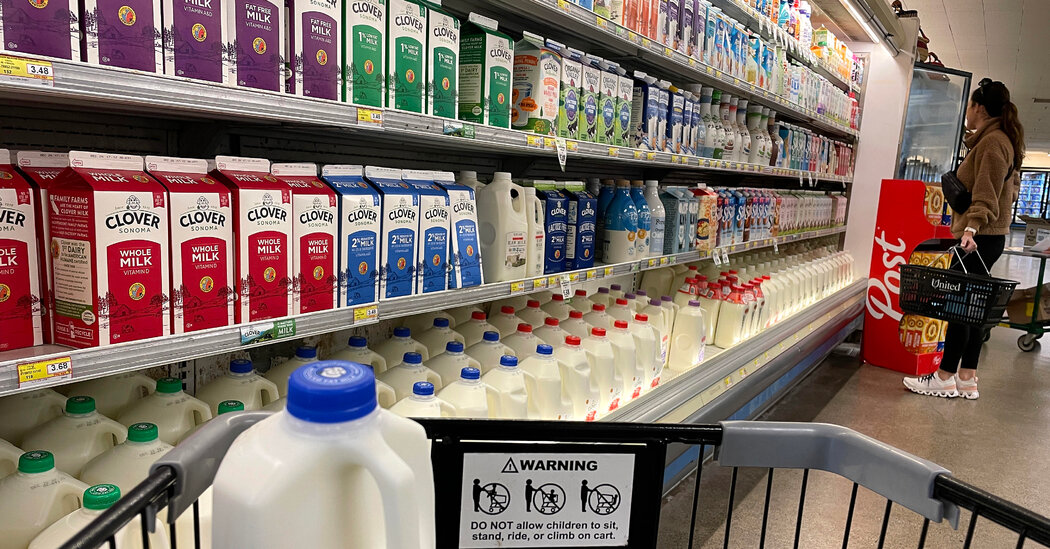
Federal regulators said Friday they had not yet discovered live avian influenza virus in the first batch of milk samples tested at retail, a reassuring indication that milk on store shelves remains safe despite an outbreak of the virus among dairy cows.
In an online update, the Food and Drug Administration said that an initial series of tests looking for live viruses, not just genetic fragments, suggests that the pasteurization process was actually neutralizing the pathogen.
“These findings reaffirm our assessment that the commercial supply of milk is safe,” the FDA wrote in the update, adding that testing efforts were ongoing.
Officials also tested formula for infants and toddlers, which incorporates powdered dairy products, and did not find the virus, the agency wrote.
The FDA launched a nationwide investigation of milk samples shortly after discovering an outbreak of the avian influenza virus, called H5N1, among dairy cows. Government scientists tested 297 retail dairy samples from 38 states, a swath of the country that covers regions well beyond the nine states known to have infected herds.
The first type of testing regulators conduct, a form of polymerase chain reaction, or PCR, is relatively fast, but it only picks up genetic traces of the virus and doesn't tell researchers whether the live pathogen is present.
On Thursday, the FDA said such tests showed that about one in five samples of milk sold at retail nationwide contained fragments of the avian flu virus, suggesting it was spreading among cows much more widely than previously known.
Samples containing genetic fragments are subsequently analyzed for live avian influenza virus which, if present, could pose a widespread health threat.
The test for the live virus, called egg inoculation, is the most sensitive of its kind, but it takes time. The process involves injecting some of the dairy product into chicken eggs, waiting for the virus to grow in the egg, and then looking for signs of infection.
Chicken eggs are efficient vessels for the growth of influenza viruses; even meager quantities will thrive there. For this reason, the new FDA findings strongly suggest that the samples tested did not contain infectious viruses and that pasteurization works, the scientists said.
The negative results reported Friday came from a “limited set of geographically targeted samples,” according to the FDA. Officials did not say where the samples came from.
“The answer at this point seems pretty definitive: Pasteurized milk is safe,” said Samuel Scarpino, a health sciences professor at Northeastern University. “The fact that it tested negative is really strong evidence that, at least in the samples tested, there is no live virus.”
Raw milk is never safe to drink, experts say, and poses additional risks in the context of the avian flu outbreak in cattle. Nearly all milk produced on U.S. farms is pasteurized, a process that kills pathogens with heat. Influenza viruses are known to be fragile and sensitive to heat.
Scientists stressed that the federal government should test more milk samples and continue testing them as the outbreak continues. Some officials blamed officials for not acting sooner.
“The FDA should have done these tests six weeks ago when we first heard about it,” Dr. Scarpino said, referring to the outbreak among cattle.
Dr. Scarpino also urged the government to conduct experiments inoculating eggs with milk containing different concentrations of viral genetic material. Such tests, he said, could provide reassurance that even pasteurized milk containing large amounts of genetic fragments remains safe to drink.
In addition to pasteurization, other existing safety procedures require that milk from obviously symptomatic cows be excluded from the commercial supply. While more study is needed, Dr. Scarpino said, “you start layering these things on top of each other, and it becomes extremely unlikely that a problem will actually occur.”
Andrew Bowman, a veterinary epidemiologist at Ohio State University who studied 150 retail milk samples collected in the Midwest, said the FDA's findings mirrored the results of ongoing tests it was conducting for the live virus.
The FDA's analysis on Friday showed that the replicating virus was still unlikely to be found in retail milk samples anywhere.
“I have a gallon of milk in my refrigerator that could be used tonight,” he said.
